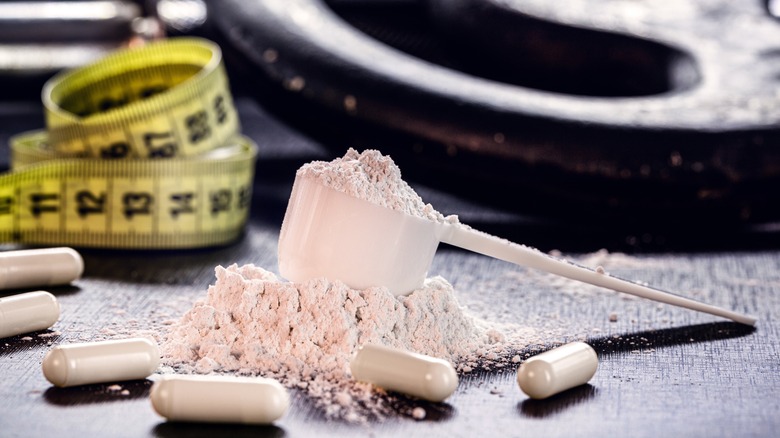Can Creatine Be Good For Brain Health?
Bodybuilders and athletes have reaped the benefits of creatine to help gain strength and aid recovery. Although our bodies naturally create this amino acid, we also take in about one or two grams of creatine per day through meat, milk, or seafood (per Cleveland Clinic). Creatine not only powers our muscles, but it can also power our brain.
According to a 2018 article in the European Journal of Sports Science, the brain needs energy, particularly when it's under stress. Creatine can serve as a preventative or therapeutic supplement in helping people recover their proper functioning of the brain, particularly those who have suffered from traumatic brain injuries or sleep deprivation.
A 2019 review in Biomolecules looked at research from various disciplines and found that depression is linked to a disruption in how the brain operates. The researchers concluded that creatine might help people with major depressive disorders when combined with other therapies, although larger clinical trials were needed.
Nutrients published a review in 2021 which found that creatine can improve cognition and brain functioning, even though the results have been mixed. The research varies in terms of dosage, with some studies experimenting with 5 grams of creatine a day, and others using 20 grams daily. The researchers noted that creatine might have more benefits for people who have low levels of creatine in the brain but less beneficial for people who are already healthy.
Is creatine safe?
Even if the effectiveness of creatine on brain health is mixed, the supplement is considered safe, according to Mayo Clinic. If you consume more than 300 milligrams of caffeine per day, it will reduce the effectiveness of creatine. According to Healthline, supplementing can help, especially if you're a vegetarian. The most common form of creatine is creatine monohydrate, even though it causes some cramping or nausea. The other forms of creatine, such as ethyl ester, hydrochloride, or liquid, have either been found to be less effective or not studied in research.
Cleveland Clinic adds the U.S. Food and Drug Administration doesn't monitor the quality of creatine supplements on the market, so some products might be safer than others. You should also consult your doctor before taking creatine if you have kidney disease, or you're pregnant or nursing. It's also unclear how creatine might interact with your current prescriptions or over-the-counter medications.


